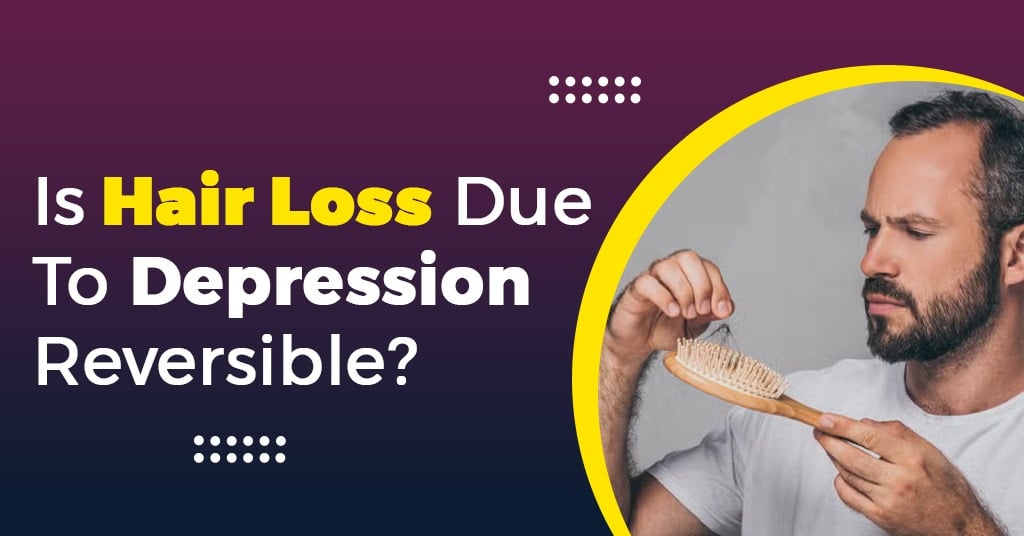Hair loss is a common concern that affects millions of people around the world, and it can be caused by a variety of factors. While genetics, hormonal imbalances, and medical conditions are well-known causes of hair loss, the link between mental health, specifically depression, and hair loss is becoming more widely recognized. In this blog post, we’ll look at the complex relationship between depression and hair loss, as well as whether hair loss caused by depression can be reversed.
Hair loss is more than just a physical concern; it can also have a significant impact on one’s mental and emotional well-being. While genetics, hormonal imbalances, and medical conditions are frequently cited as primary causes of hair loss, the impact of mental health, particularly depression, is increasingly recognized. Depression, a common mental health disorder marked by persistent feelings of sadness, hopelessness, and low self-esteem, can have a significant impact on many physiological processes, including hair growth. Chronic stress, a common feature of depression, can disrupt the delicate balance of hormones in the body, resulting in increased cortisol levels. This surge in cortisol, also known as the “stress hormone,” can disrupt the hair growth cycle, causing hair follicles to enter a resting phase prematurely, resulting in increased shedding and thinning of hair. Additionally, individuals suffering from depression may experience changes in their immune function, exacerbating hair loss. Furthermore, depression can manifest as compulsive hair-pulling (trichotillomania) or a lack of self-care routines, both of which can lead to hair loss. The link between depression and hair loss is complex and multifaceted, emphasizing the significance of addressing mental health concerns in the context of hair loss management. In the following sections, we will explore the potential reversibility of hair loss caused by depression and outline strategies to mitigate its impact on hair health.
Understanding the Link Between Depression and Hair Loss:
- Stress and Cortisol Levels: Depression frequently results in chronic stress, which causes the release of cortisol, a hormone linked to hair thinning and loss. Elevated cortisol levels disrupt the hair growth cycle, resulting in increased shedding and potential hair loss.
Reduced Blood Flow: Depression can impair circulation, resulting in reduced blood flow to the scalp. Poor blood circulation strips hair follicles of vital nutrients and oxygen, reducing their ability to produce healthy hair strands.
- Telogen Effluvium: Severe emotional stress, such as that felt during depression, can cause telogen effluvium. This disorder causes a large number of hair follicles to enter the resting (telogen) phase prematurely, resulting in excessive shedding and visible hair thinning.
- Trichotillomania: Trichotillomania is a disorder in which people pull their hair compulsively. It is frequently associated with anxiety and depression. Individuals with trichotillomania may experience noticeable hair loss as a result of excessive pulling or twisting of hair strands.
Is Hair Loss Due to Depression Reversible?
- Addressing Underlying Mental Health Issues: The first step in addressing hair loss caused by depression is to seek professional help for the underlying mental health condition. Individuals who receive therapy, counseling, and medication can effectively manage their depression symptoms, potentially halting further hair loss.
- Stress Reduction Techniques: Stress reduction techniques such as mindfulness, meditation, and relaxation exercises can help alleviate stress and lower cortisol levels, resulting in a healthier scalp environment that promotes hair growth.
- Healthy Lifestyle Changes: Living a healthy lifestyle that includes regular exercise, a well-balanced diet rich in essential nutrients, and enough sleep can improve overall well-being and hair health.
- Topical Treatments and Supplements: The best hair transplant surgeon in Varanasi may recommend topical treatments or supplements containing ingredients such as minoxidil, biotin, or vitamins that promote hair growth. These interventions can help to manage depression and promote hair growth.
Conclusion:
While hair loss caused by depression can be upsetting, it is often reversible with proper management of the underlying mental health condition and the implementation of healthy lifestyle practices. Individuals who address depression through therapy, stress reduction techniques, and lifestyle changes can reduce the impact of stress-related hair loss and promote healthy hair regrowth. Seeking professional advice from hair health professionals and dermatologists is critical for developing a hair transplant surgery in Varanasi plan that is tailored to your specific needs. Remember that, while hair loss is a visible symptom of depression, it is only one component of a larger journey toward mental and emotional well-being.

